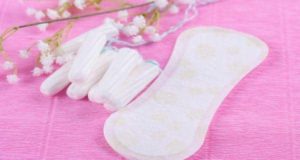Barak UpdatesBreaking News
Sanitary napkins distributed among female prisoners at Hailakandi district jail

May 2: Keeping in view the concept of hygiene, sanitary napkins were distributed by the Hailakandi District Administration to ladies in District Jail on Wednesday. The goal is to switch to healthier practices on menstrual hygiene and personal cleanliness for better health of the woman contributing to better health of the family.

Traditionally, women used cloth for protection during menstruation, washing and reusing them repeatedly. Those who are poor use rags, ash, or husk. Lack of menstrual hygiene results in diseases such as urinary/reproductive tract infections as well as bacterial vaginosis which is the proliferation of bacteria in the vagina.
 A menstrual pad is a type of feminine hygiene product that is worn externally, unlike tampons and menstrual cups which are worn inside the vagina. The frequency a woman will need to change her pad will vary depending on whether her menstrual flow is heavy or light.
A menstrual pad is a type of feminine hygiene product that is worn externally, unlike tampons and menstrual cups which are worn inside the vagina. The frequency a woman will need to change her pad will vary depending on whether her menstrual flow is heavy or light.

10 menstrual hygiene tips every girl and woman should know:
- Choose your method of sanitation: Today there are a number of ways including the use of sanitary napkins, tampons and menstrual cups to stay clean. In India, most unmarried girls prefer to use sanitary napkins. If you do decide to use a tampon remember that it is essential to choose one that has the lowest absorbency rate for your flow.
- Change regularly: Menstrual blood – once it has left the body – gets contaminated with the body’s innate organisms. When these organisms remain in a warm and moist place for a long time they tend to multiply and can lead to conditions like urinary tract infection, vaginal infections and skin rashes. The standard time to change a sanitary pad is once every six hours, while for a tampon is once every two hours. That being said, you have to customize the changing schedule to your needs.
 3. Wash yourself regularly: When you menstruate, the blood tends to enter tiny spaces like the skin between your labia or crust around the opening of the vagina and you should always wash this excess blood away.
3. Wash yourself regularly: When you menstruate, the blood tends to enter tiny spaces like the skin between your labia or crust around the opening of the vagina and you should always wash this excess blood away.
4. Don’t use soaps or vaginal hygiene products: The vagina has its own cleaning mechanism that works in a very fine balance of good and bad bacteria. Washing it with soap can kill the good bacteria making way for infections. So, while it is important to wash yourself regularly during this time, all you need to use is some warm water.

5. Use the right washing technique: Always wash or clean the area in a motion that is from the vagina to the anus. Never wash in the opposite direction. Washing in the opposite direction can cause bacteria from the anus to lodge in the vagina and urethral opening, leading to infections.
6. Discard your used sanitary product properly: It is essential to discard your used napkins or tampons properly because they are capable of spreading infections, and smell very foul. Wrapping it well before discarding it ensures that the smell and infection is contained.

7. Beware of a pad rash: A pad rash is something that you might experience during a period of heavy flow. It usually occurs when the pad has been wet for a long time and rubs along the thighs causing it to chaff. To prevent this from occurring, try to stay dry during your periods. If you do have a rash, change your pads regularly and stay dry.
8. Use only one method of sanitation at a time: Some women who have heavy flow during their periods tend to use either (i) two sanitary pads, (ii) a tampon and sanitary pad (iii) a sanitary pad along with a piece of cloth. This might seem like a good idea, but it actually is not, changing regularly is a better option.

9. Have a bath regularly: Bathing not only cleanses your body but also gives you a chance to clean your private parts well. It also helps relieve menstrual cramps, backaches, helps improve your mood and makes you feel less bloated.
10. Be ready with on-the-go stuff during your periods: When you have your periods it is important to be ready. It is important to have extra sanitary pads or tampons properly stored in a clean pouch or paper bag, a soft towel, some paper tissues or towels, hand sanitizer, a healthy snack, bottle of drinking water, a tube of antiseptic medication (if you are using one).



